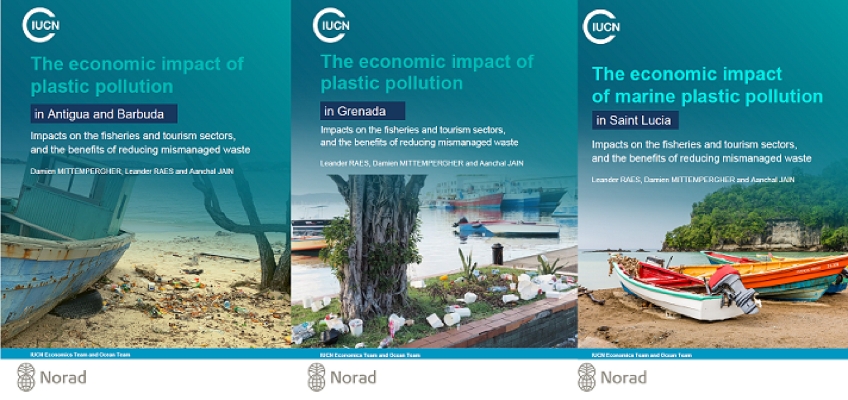

16 / 2023.16
With support from the Norwegian Agency for Development Cooperation (Norad), the Plastic Waste Free Islands project focused on six islands in the Pacific and the Caribbean regions: Fiji, Samoa, Vanuatu, Antigua and Barbuda, Grenada, and Saint Lucia.
Three new economic briefs for the Caribbean demonstrate the impacts that plastic pollution has on the marine environment, livelihoods, and economic and social aspects of island life.

Marine plastic pollution has great economic and societal repercussions. Industries like tourism and fishing as well as communities rely on marine environments for their livelihoods, and marine pollution reduces these economic opportunities. Marine ecosystems also have immense cultural significance to communities and plastic pollution poses a threat to the cultural heritage and history we have preserved over time. The transboundary nature of the problem is more significant on islands, as many islands are tourism-dependent. A cleaner ocean is essential to the island communities’ well-being, biodiversity, and livelihoods.
Plastics impact fisheries through dumped catch, fouling incidents, net repairs and time lost cleaning nets; while ghost fishing can generate additional revenue losses. Tourism can be impacted when tourists are no longer willing to visit, due to plastic litter on beaches. In order to avoid this impact, beach clean-up costs need to be incurred. These, and other factors, are costs associated with marine plastic pollution.
These three studies provide in-depth analysis of the economic impacts of plastic pollution on tourism and fisheries in Antigua and Barbuda, Grenada, and Saint Lucia, and estimate direct costs for the economy of each island. There is also a summary document highlighting the economic impacts of plastic pollution in the Caribbean Sea.
Governments of these islands have started to recognise the impacts on their social and economic well-being and have started to work on measures to curb plastic pollution. Most measures focus on bans of single-use plastics and polystyrene, which comprise around 80% of Caribbean marine litter. Considering the significant amount of PET and high-density polyethylene (HDPE) plastic leakage across the Caribbean islands, container deposit and transport schemes could prove effective to incentivise region-wide reverse logistics and to create recycling markets for countries without such availability. To ensure sustainability of the Caribbean Sea’s ecosystems, an integrated management approach with local stakeholders and government as well as with other nations is needed.
The three briefs in one compiled document are posted here.
The individual economic briefs for the three Caribbean islands can be found at these links:
Antigua and Barbuda
Grenada
Saint Lucia